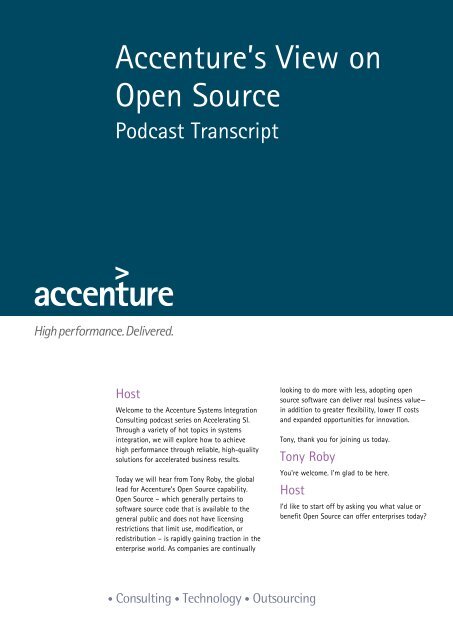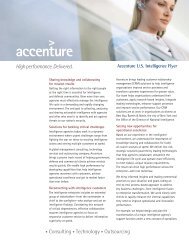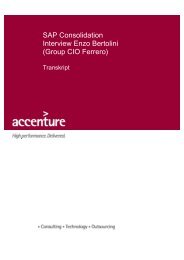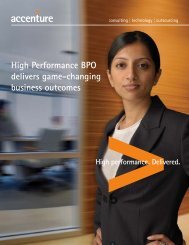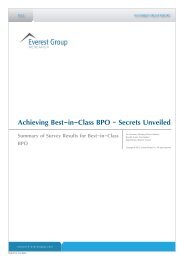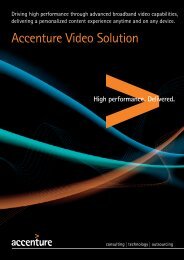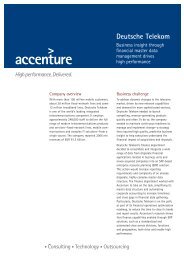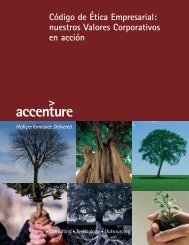Accenture's View on Open Source
Accenture's View on Open Source
Accenture's View on Open Source
You also want an ePaper? Increase the reach of your titles
YUMPU automatically turns print PDFs into web optimized ePapers that Google loves.
Accenture’s <str<strong>on</strong>g>View</str<strong>on</strong>g> <strong>on</strong><br />
<strong>Open</strong> <strong>Source</strong><br />
Podcast Transcript<br />
Host<br />
Welcome to the Accenture Systems Integrati<strong>on</strong><br />
C<strong>on</strong>sulting podcast series <strong>on</strong> Accelerating SI.<br />
Through a variety of hot topics in systems<br />
integrati<strong>on</strong>, we will explore how to achieve<br />
high performance through reliable, high-quality<br />
soluti<strong>on</strong>s for accelerated business results.<br />
Today we will hear from T<strong>on</strong>y Roby, the global<br />
lead for Accenture’s <strong>Open</strong> <strong>Source</strong> capability.<br />
<strong>Open</strong> <strong>Source</strong> – which generally pertains to<br />
software source code that is available to the<br />
general public and does not have licensing<br />
restricti<strong>on</strong>s that limit use, modificati<strong>on</strong>, or<br />
redistributi<strong>on</strong> – is rapidly gaining tracti<strong>on</strong> in the<br />
enterprise world. As companies are c<strong>on</strong>tinually<br />
looking to do more with less, adopting open<br />
source software can deliver real business value—<br />
in additi<strong>on</strong> to greater flexibility, lower IT costs<br />
and expanded opportunities for innovati<strong>on</strong>.<br />
T<strong>on</strong>y, thank you for joining us today.<br />
T<strong>on</strong>y Roby<br />
You’re welcome. I’m glad to be here.<br />
Host<br />
I’d like to start off by asking you what value or<br />
benefit <strong>Open</strong> <strong>Source</strong> can offer enterprises today?
T<strong>on</strong>y Roby<br />
<strong>Open</strong> <strong>Source</strong> represents a significant<br />
shift in enterprise IT because it enables<br />
companies to obtain robust, reliable<br />
and proven alternatives to the<br />
commercial middleware that they’re<br />
using at substantially lower cost. <strong>Open</strong><br />
<strong>Source</strong> doesn’t have any up-fr<strong>on</strong>t<br />
license fees and it really is paid for<br />
using an <strong>on</strong>going subscripti<strong>on</strong> model.<br />
And those subscripti<strong>on</strong> costs, which<br />
cover maintenance and training, can<br />
be 70-90 percent less than those for<br />
typical commercial opti<strong>on</strong>s.<br />
So for an enterprise, <strong>Open</strong> <strong>Source</strong><br />
allows really a lowering of up-fr<strong>on</strong>t<br />
capital investment, it allows you to<br />
shift expenses from capital to operati<strong>on</strong>al<br />
budgets. And it allows enterprises<br />
therefore to devote funds to<br />
what they know works and discard<br />
approaches that d<strong>on</strong>’t succeed. So this<br />
freedom allows organizati<strong>on</strong>s to get<br />
much better flexibility.<br />
So certainly in this ec<strong>on</strong>omy, if<br />
you increase the use of open source<br />
software, CIOs can reduce the<br />
maintenance fees that they are<br />
paying <strong>on</strong> existing software and they<br />
can start to shift their envir<strong>on</strong>ments<br />
towards a lower cost <strong>Open</strong> <strong>Source</strong><br />
platform and then positi<strong>on</strong> themselves<br />
to potentially renegotiate their<br />
commercial licenses <strong>on</strong>ce they come<br />
up for renewal. It also allows them<br />
to c<strong>on</strong>tinue to get work d<strong>on</strong>e – so<br />
projects that may stall because they<br />
d<strong>on</strong>’t have the right software and they<br />
can’t afford the right software can<br />
really start now with free <strong>Open</strong> <strong>Source</strong><br />
without incurring those upfr<strong>on</strong>t<br />
software costs.<br />
Also, the <strong>Open</strong> <strong>Source</strong> community<br />
development model really means that<br />
the features that are most needed by<br />
the community are really the <strong>on</strong>es<br />
that get built and enhanced fist. And<br />
that happens often more quickly, than<br />
would happen in a commercial<br />
envir<strong>on</strong>ment. This is true even for<br />
companies that are developing and<br />
licensing their software as open<br />
source. In fact their revenue, which<br />
is the subscripti<strong>on</strong>s that they get is<br />
really based <strong>on</strong> delivering the value<br />
that the clients are looking for.<br />
So as an example, Accenture<br />
collaborated with the French Revenue<br />
Agency and this was <strong>on</strong>e of the largest<br />
commercial implementati<strong>on</strong>s of a<br />
system based <strong>on</strong> open source. It was a<br />
migrati<strong>on</strong> actually from a commercial<br />
software platform and the agency<br />
needed new applicati<strong>on</strong>s that would<br />
allow taxpayers to securely and easily<br />
declare their taxes <strong>on</strong>line. So what<br />
they did was build a soluti<strong>on</strong> was<br />
entirely c<strong>on</strong>structed <strong>on</strong> open source<br />
middleware and operating systems<br />
and it went live in 2007. About 7<br />
milli<strong>on</strong> users declared their income<br />
<strong>on</strong>line and it made a success for the<br />
Agency and Accenture. And it’s a<br />
European reference for tax-declarati<strong>on</strong><br />
applicati<strong>on</strong>s.<br />
Host<br />
Thank you T<strong>on</strong>y. What are some of<br />
the biggest challenges clients must<br />
overcome in the <strong>Open</strong> <strong>Source</strong> space?<br />
T<strong>on</strong>y Roby<br />
While the advantages of <strong>Open</strong> <strong>Source</strong><br />
are real, organizati<strong>on</strong>s need to ensure<br />
that they have some safeguards in<br />
place to address three key challenges.<br />
First, open source can be readily<br />
downloaded from the internet and<br />
because of that and because it evolves<br />
very differently to commercial<br />
software, it’s very easy to get multiple<br />
different variants of the same open<br />
source software introduced into the<br />
enterprise. So that raises integrati<strong>on</strong><br />
challenges, support challenges and<br />
because you can just download it from<br />
the internet, all of this can happen<br />
under the radar of IT operati<strong>on</strong>s.<br />
Sec<strong>on</strong>dly, open source changes very<br />
rapidly so the benefit of the community<br />
model is that you get the functi<strong>on</strong>ality<br />
that you need very quickly<br />
but that comes at a cost of rapidly<br />
changing software. Also, communities<br />
provide no guarantees of support.<br />
And then thirdly, the interdependencies<br />
between different open source<br />
products and all of these are licensed<br />
under a whole variety of licensing and<br />
can result in both integrati<strong>on</strong>s issues<br />
and also in c<strong>on</strong>flicts with the software<br />
licenses. So really the big challenge<br />
around open source for a large<br />
enterprise is making sure you can<br />
manage it. So, unmanaged open<br />
source can create some very real<br />
operati<strong>on</strong>al challenges in terms of<br />
costs and complexity, as well as<br />
potentially introducing some legal<br />
risks. And Accenture has found that<br />
many organizati<strong>on</strong>s are not properly<br />
addressing these crucial factors things<br />
like versi<strong>on</strong> c<strong>on</strong>trol, license management<br />
support, and nor are they creating<br />
formal programs for managing<br />
<strong>Open</strong> <strong>Source</strong> in the enterprise. So we<br />
believe the biggest challenge for our<br />
clients to get the value of open source<br />
is to put in place proper governance.<br />
Host<br />
What about the idea that <strong>Open</strong> <strong>Source</strong><br />
is free?<br />
T<strong>on</strong>y Roby<br />
Well, that’s a good questi<strong>on</strong>. <strong>Open</strong><br />
source can be downloaded for free,<br />
but it’s not free of risk, cost or<br />
obligati<strong>on</strong>. The costs really revolve<br />
around the hardware, the management<br />
of the software, many related<br />
training that’s required to deploy<br />
and run the open source software.<br />
So it’s not free from the total cost of<br />
ownership perspective. The companies<br />
that use open source really need to<br />
understand the obligati<strong>on</strong> imposed by<br />
the licenses. So the ability to obtain<br />
the software for free is somewhat<br />
traded off by the need to comply with<br />
the license. Now in some of those<br />
licenses, require that you to actually<br />
distribute source code. So if you<br />
modify the code or if you actually<br />
incorporate that code into an overall<br />
soluti<strong>on</strong>, in certain ways you have to<br />
distribute the source code for that<br />
soluti<strong>on</strong> to an open source<br />
community.
This <strong>on</strong>ly occurs when you are<br />
actually making the software<br />
available outside of your enterprise,<br />
but it’s something that trips people<br />
up. Other obligati<strong>on</strong>s may require<br />
you to clearly state in documentati<strong>on</strong><br />
or in other areas of your software<br />
that you’re using open source, so<br />
attributi<strong>on</strong> is an important obligati<strong>on</strong>.<br />
And clearly understanding the obligati<strong>on</strong>s<br />
imposed by the various licenses,<br />
and there’s over 20 different licenses<br />
that are broadly recognized as open<br />
source. And then rec<strong>on</strong>ciling those<br />
obligati<strong>on</strong>s with the scenarios in<br />
which you’re using the <strong>Open</strong> <strong>Source</strong><br />
is really a fundamental requirement<br />
for using and benefiting from open<br />
source software.<br />
To take full advantage of being<br />
able to implement open source<br />
comprehensively and successfully,<br />
organizati<strong>on</strong>s really need to have this<br />
governance structure in place so that<br />
they can address up fr<strong>on</strong>t how open<br />
source will be integrated within the<br />
overall IT strategy and then how<br />
different projects use that open<br />
source making sure that the licenses<br />
and the scenarios under which the<br />
open source is being used is really<br />
acceptable to the company. So<br />
governing the use of the licenses is<br />
really the trade off for being able to<br />
obtain the free software.<br />
Host<br />
What do you recommend to your<br />
clients to help get the most out of<br />
<strong>Open</strong> <strong>Source</strong>?<br />
T<strong>on</strong>y Roby<br />
The primary thing I recommend them<br />
to do is use it. But first of all, what<br />
I’d say within that is take a portfolio<br />
view of your applicati<strong>on</strong>s and infrastructure.<br />
Look for those applicati<strong>on</strong>s<br />
that are running <strong>on</strong> expensive,<br />
proprietary infrastructure and middleware<br />
and could be migrated to less<br />
expensive, yet just as capable, open<br />
source alternatives. Look to understand<br />
the value of an applicati<strong>on</strong> and<br />
determine whether its commensurate<br />
with the cost of the infrastructure<br />
and middleware <strong>on</strong> which it’s running.<br />
There’s a lot of opportunity in most<br />
organizati<strong>on</strong>s to migrate large<br />
porti<strong>on</strong>s of their applicati<strong>on</strong>s <strong>on</strong>to<br />
open source. But to do that, <strong>on</strong>ce<br />
you decide to migrate, or decide to<br />
implement new applicati<strong>on</strong>s <strong>on</strong><br />
open source you’ll need to do that<br />
deliberately and to do that, establish<br />
integrated open source stacks that<br />
support the particular applicati<strong>on</strong><br />
styles. Those stacks can be assembled,<br />
integrated and tested by IT so that<br />
you have a fully integrated, reliable<br />
top to bottom stack and then they<br />
can roll those out in a supportive<br />
fashi<strong>on</strong> to your envir<strong>on</strong>ment. So do<br />
this deliberately rather than piece<br />
meal, project by project.<br />
And then <strong>on</strong> top of all of that, make<br />
sure you establish <strong>Open</strong> <strong>Source</strong><br />
governance to provide the necessary<br />
structures, c<strong>on</strong>trols and management<br />
required to manage the open source<br />
in your organizati<strong>on</strong>. So that would<br />
include the license management the<br />
set up of support capabilities and<br />
also the ability to interact with the<br />
communities that you need.<br />
Also, lastly I wouldn’t just focus <strong>on</strong><br />
custom java applicati<strong>on</strong>s, which is<br />
primarily where open source is played.<br />
You should look at the entire open<br />
source domain. There’s plenty of open<br />
source available that’s very capable<br />
that deals with enterprise service, and<br />
Service Oriented Architecture. That<br />
deals with server virtualizati<strong>on</strong>,<br />
enterprise portals, c<strong>on</strong>tent management,<br />
business intelligence and<br />
reporting, and the list goes <strong>on</strong>, so cast<br />
the net wide.<br />
Host<br />
Thank you T<strong>on</strong>y.<br />
T<strong>on</strong>y Roby<br />
Thank you. It was my pleasure.<br />
Host<br />
With that, I would like to close this<br />
podcast and thank you all for<br />
listening. To find out more about<br />
our Systems Integrati<strong>on</strong> C<strong>on</strong>sulting<br />
services, please visit www.accenture.<br />
com/si.
Copyright © 2009 Accenture<br />
All rights reserved.<br />
Accenture, its logo, and<br />
High Performance Delivered<br />
are trademarks of Accenture.


